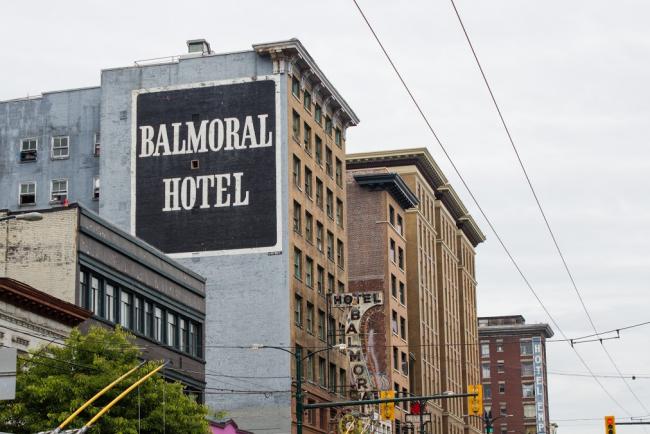Articles Menu

The City of Vancouver now owns the Regent and Balmoral hotels, Downtown Eastside buildings the city had been trying to expropriate after years of neglect and decay, The Tyee has learned.
Land title records list the city as the current owner of 159 E. Hastings — the Balmoral — and 160 E. Hastings — the Regent.
The city confirmed to The Tyee that a settlement with the owners, the Sahota family, had been reached. But the city says the terms of the agreement prevent it from revealing how much was paid to purchase the properties, which have been assessed at a value of $1 each because of their extreme disrepair.
Sam Dharmapala worked in the buildings as an employee of the former owners, the Sahota family. For a decade, Dharmapala said, he worked alongside tenants and advocates to raise the alarm about the dangerous living conditions at the hotels.
“This is a very good fight in the history of the Downtown Eastside,” Dharmapala said. “We want to see [the hotels] go back to the residents of the Downtown Eastside, who have lived in those buildings.”
Dharmapala said the city needs to ensure all the units in the two hotels are rented at the welfare shelter rate — $375 for a single person — to provide homes for Vancouver’s poorest residents. The hotels had provided more than 300 units.
The records show the transfer happened Nov. 13, one year after Vancouver city council voted unanimously to expropriate the hotels in a groundbreaking decision.
Council voted to expropriate after decades of repeated building code and bylaw violations and after taking the owners, the Sahota family, to court numerous times.
It was the first time the city had ever attempted to expropriate residential buildings because of extreme neglect. The city started the court action with the intention of renovating or redeveloping the properties for low-income housing.
Before the expropriation vote, council heard from dozens of tenants and former tenants who described living with no heat or hot water, constant bedbug, rat and cockroach infestations and the fear of what would happen if there were a fire. Tenants had lived in squalor in the two buildings for decades.
City building inspectors ordered the Balmoral to be emptied in the summer of 2017 because it was in such poor condition. One year later, the Regent was also condemned. Tenants of both buildings were moved into other buildings by the City of Vancouver and BC Housing.
Karen Ward, a Downtown Eastside resident who now works for the city as a drug policy advisor, said city building inspectors initially closed just the bathrooms of the Balmoral in June 2017 because they feared bathtubs could plunge through the rotten floors.
Ward worked at the Vancouver Area Network of Drug Users at the time.
“People were coming to me daily to say they were terrified to go into their own home,” Ward said.
Ward called for the buildings to be torn down and for modular housing to be quickly built in their place.
“We can build a six- to eight-story building and house 100 people by April,” Ward said. “It’s a desperate situation out here and we don’t need to do things the old way — we can use modular housing to build housing that decreases the chance of death for drug users. We can do this.”
Overdose deaths have soared throughout 2020 and homelessness has increased as COVID-19 restrictions have made the drug supply more toxic and reduced the number of places people can go to find shelter.
Vancouver’s mayor, Kennedy Stewart, said the city plans to work with BC Housing to turn the buildings into low-income housing.
“Bringing the Regent and Balmoral into public ownership marks a hopeful new beginning for residents of the Downtown Eastside and something all residents should be proud of,” Stewart was quoted as saying in a press release. “Downtown Eastside residents will be at the centre of creating a new vision for these two sites, and indeed the entire community.”
B.C.’s attorney general and minister responsible for housing, David Eby, also weighed in, saying: “For too long, people had to live in sub-standard living conditions in these buildings. The acquisition of these properties is welcome news.”
The next steps will be to start community consultation sessions with the Downtown Eastside community, and city staff will report back to council on next steps and a timeline for renovating or redeveloping the properties in early 2021, according to the City of Vancouver.
On Nov. 3, city communications staff told The Tyee court expropriation proceedings were paused while the city worked with “representatives of the owners of the Regent and the Balmoral to resolve the expropriation of the hotels.”
The Tyee has reached out to the city for comment.
In a statement emailed to The Tyee by lawyer Evan Cooke, the Sahota family confirmed they had come to an agreement with the city.
“We have determined that the public sector is better equipped to respond to the acute needs of the area’s residents at this time; including their urgent need for housing, mental health and substance abuse support, and other critical programs.”
The statement said the details of the transfer are confidential. ![]()
Jen St. Denis is The Tyee’s Downtown Eastside reporter. Find her on Twitter @JenStDen. This reporting beat is made possible by the Local Journalism Initiative.
Read more: Housing, Municipal Politics
[Top photo: The City of Vancouver now owns the Regent and Balmoral hotels in the Downtown Eastside. Photo by Christopher Cheung.]